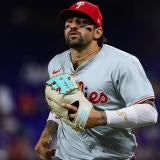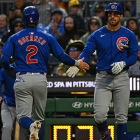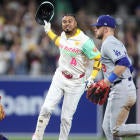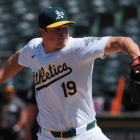The 2018 National Baseball Hall of Fame class will be announced on Jan. 24. In the days leading up to that announcement, we here at CBS Sports will profile one Hall of Fame candidate per day, provided that player is expected to receive the 5 percent of the vote necessary to remain on the ballot another year. Today's candidate: Omar Vizquel.
Vizquel, who played for six teams (Mariners, Indians, Giants, Rangers, White Sox, Blue Jays) during his 24-year career (1989-2012), is on the Hall of Fame ballot for the first time this year. If inducted, Vizquel would become only the second Venezuelan-born player in the Hall of Fame, joining the great Luis Aparicio. Let's break down the cases for and against Vizquel.
The case for Vizquel
There are two components to Vizquel's Hall of Fame case: his defense and his longevity. He was a spectacular defensive shortstop who made highlight plays look easy. Vizquel is the all-time leader in both defensive games at shortstop (2,709) and fielding percentage at shortstop (.9847). Among players who played at least 50 percent of their career games at shortstop, he is seventh all time in defensive WAR.
- Ozzie Smith: 43.4
- Mark Belanger: 39.4
- Cal Ripken Jr.: 34.6
- Joe Tinker: 34.3
- Luis Aparicio: 31.6
- Rabbit Maranville: 30.9
- Omar Vizquel: 28.4
Some have called Vizquel the second greatest defensive shortstop in baseball history behind Smith, which might be a stretch, but there is no doubt he was the game's premier defender at the position during his prime. We can't talk about any player's defensive prowess without some highlights, so here's Vizquel in action:
Beyond his glovework, Vizquel also stands out for his durability and longevity. He played 24 seasons in the show and is 12th all time with 2,968 games played. Do you know how hard it is to stick around in the big leagues that long? It's remarkable.
Playing that long allowed Vizquel, a career .272/.336/.352 hitter, to pile up 2,877 hits (43rd all time) and 404 stolen bases (71st all time). He was awfully close to joining the hallowed 3,000-hit club, though he is still one of only 11 players in history with 2,800 hits and 400 steals, which is quite the accomplishment. It wouldn't be unfair to call Vizquel a "compiler," but you know what? There is something to be said for playing at a high level long enough to rack up that many hits and games played.
In terms of hardware, Vizquel is an 11-time Gold Glover -- he won nine straight Gold Gloves from 1993-2001 -- and three-time All-Star (1998, '99, 2002) who received MVP votes in one year (1999). He never did win a World Series, however.
The case against Vizquel
The strongest case against Vizquel as a Hall of Famer is built around his below-average offensive output. Sure, he racked up close to 3,000 hits, but that career .272/.336/.352 batting line works out to an 82 OPS+, meaning Vizquel was 18 percent worse than the average hitter in his career.
Only twice in his 24 seasons was Vizquel even an average hitter (111 OPS+ in 1998 and 104 OPS+ in 2002) and during his peak from 1996-2002, he hit .287/.358/.388 (93 OPS+). There is no way around it: Vizquel was a below-average major-league hitter for almost the entirety of his career, which spanned 12,013 plate appearances.
Was Vizquel such a good defender that it makes up for the subpar batting line, and is enough to push Vizquel into Cooperstown? Sure, that's possible. WAR, as imperfect as it is, doesn't necessarily agree. Here is a snippet of the career WAR leaderboard among players who played at least 50 percent of their career games at shortstop:
1. Honus Wagner: 113.8
2. Cal Ripken Jr.: 95.5
3. Robin Yount: 77.0
4. Ozzie Smith: 76.5
...
24. Omar Vizquel: 45.3
Among those ahead of Vizquel are Miguel Tejada (46.9 WAR) and Jimmy Rollins (46.0 WAR), if you would like to compare Vizquel to some recent players. Smith, to whom Vizquel is most often compared, was a superior defender (based on defensive WAR) and superior hitter (career 87 OPS+). That doesn't automatically mean Vizquel is not a Hall of Famer, of course. It just means it's a little disingenuous to say the two are equals or close to it.
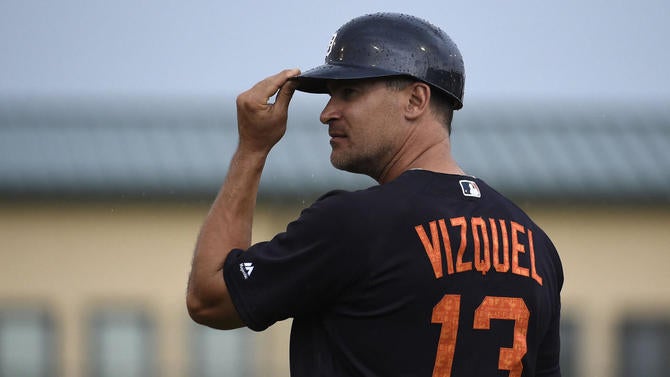
I am skeptical of defensive stats, especially historical defensive stats. I watched Vizquel play and I saw a great defensive shortstop. Better than most? Definitely. As good as Ozzie or even Andrelton Simmons? I don't believe so. Enough to make up for his below-average bat? Well, that's up for the Hall of Fame voters to decide.
For what it's worth, Jay Jaffe's JAWS system says Vizquel falls well short of the established Hall of Fame threshold for shortstops based on both peak value and overall career value. He ranks slightly behind Mark Belanger, another great defender, and just ahead of Rafael Furcal.
Will he make it?
Not this year. According to Ryan Thibodaux's public Hall of Fame ballot tracker, Vizquel has already been mathematically eliminated from getting the 75 percent needed for induction. The good news? Vizquel has also already cleared the 5 percent threshold needed to stay on the ballot, so he will be up for the Hall of Fame again next year.
As of this writing Vizquel has appeared on 27.7 percent of the public ballots on Thibodaux's tracker, indicating he needs to gain substantial support in the coming years to one day make it into Cooperstown. Vizquel had a remarkable career and is on the very short list of the best defensive shortstops in history. Most players would give anything to have his career. At the moment, the Hall of Fame voting body does not believe his glove makes up his bat.
Hall of Fame profiles: One-and-dones | Hideki Matsui










